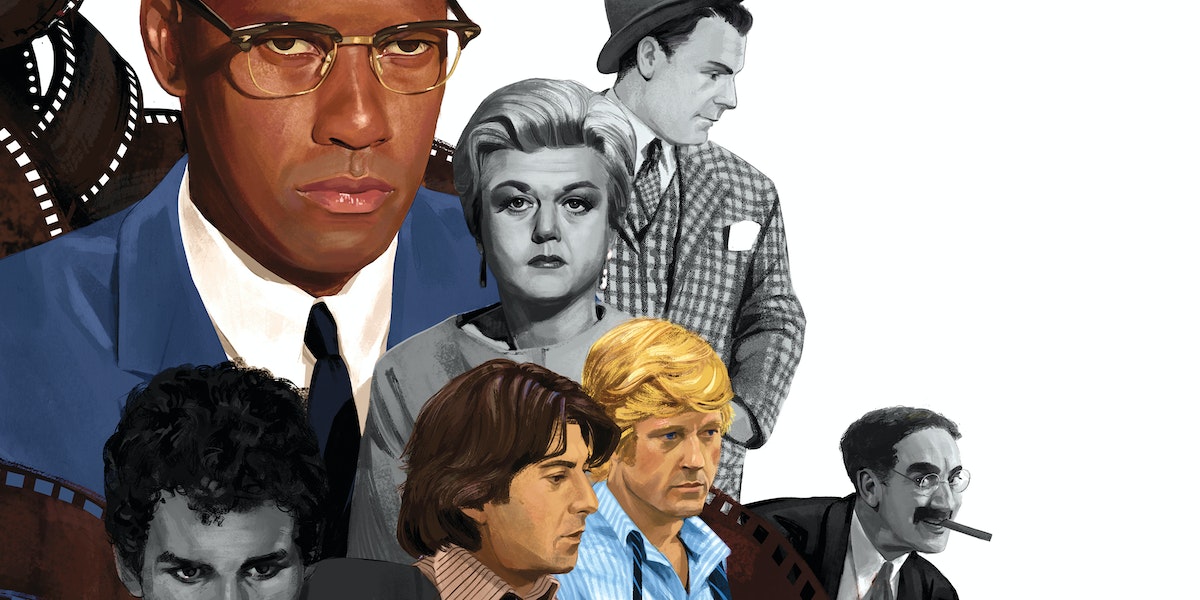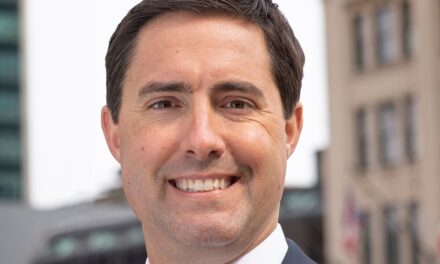We wanted to do something special for this double July-August issue of The New Republic, but we weren’t sure what; then it hit us that summer is movie season, so why not combine that fact with this magazine’s great passion and come up with a list of history’s best political movies? (TNR, by the way, is no stranger to motion pictures. For decades, the magazine published the work of famed twentieth-century critic Stanley Kauffmann, and we continue to run trenchant film analysis today.)
It was that germ of an idea that led us to reach out to J. Hoberman, one of the leading film critics of the last half-century, to curate this project. Hoberman changed it from “best” to “most significant” and led us in assembling a list of around 130 critics to whom we wrote, asking them to participate. We were pleased that 79 wrote back with their lists. On the following pages, see what they came up with, as well as Hoberman’s overview essay, and some movies that we at TNR thought deserved a mention. Discuss away—and cast your own votes at our readers’ poll here.
Summaries 100-11 written by Julian Epp, 10-1 by J. Hoberman.

100. One Sings, the Other Doesn’t
(1977) Dir: Agnès Varda
Two French women—an aspiring singer and a young mother—leading parallel lives in the 1970s reunite as they search for meaning against the backdrop of the women’s liberation movement.
99. Fail Safe
(1964) Dir: Sidney Lumet
The president attempts to contact the Soviet prime minister and prevent a nuclear catastrophe after a fleet of bombers is accidentally sent to destroy Moscow. A classic Cold War thriller.
98. The Man Who Shot Liberty Valance
(1962) Dir: John Ford
This black-and-white Western starring Jimmy Stewart and John Wayne tells the story—almost entirely through flashback—of a young lawyer traveling to a frontier town terrorized by an outlaw. Probably Ford’s most morally complex film.
97. Germany Year Zero
(1948) Dir: Roberto Rossellini
In Allied-occupied Berlin, a German boy and former Hitler Youth struggles to provide for his family in the war-torn city. The third entry in Rossellini’s War Trilogy.
96. A Grin Without a Cat
(1977) Dir: Chris Marker
A remarkable documentary and essay on radical movements worldwide, exploring the success of the global left in the 1960s and its decline in the 1970s.
95. I Am a Fugitive From a Chain Gang
(1932) Dir: Mervyn LeRoy
Unable to find work, a returning veteran is forced at gunpoint to participate in a robbery and sentenced to hard labor.
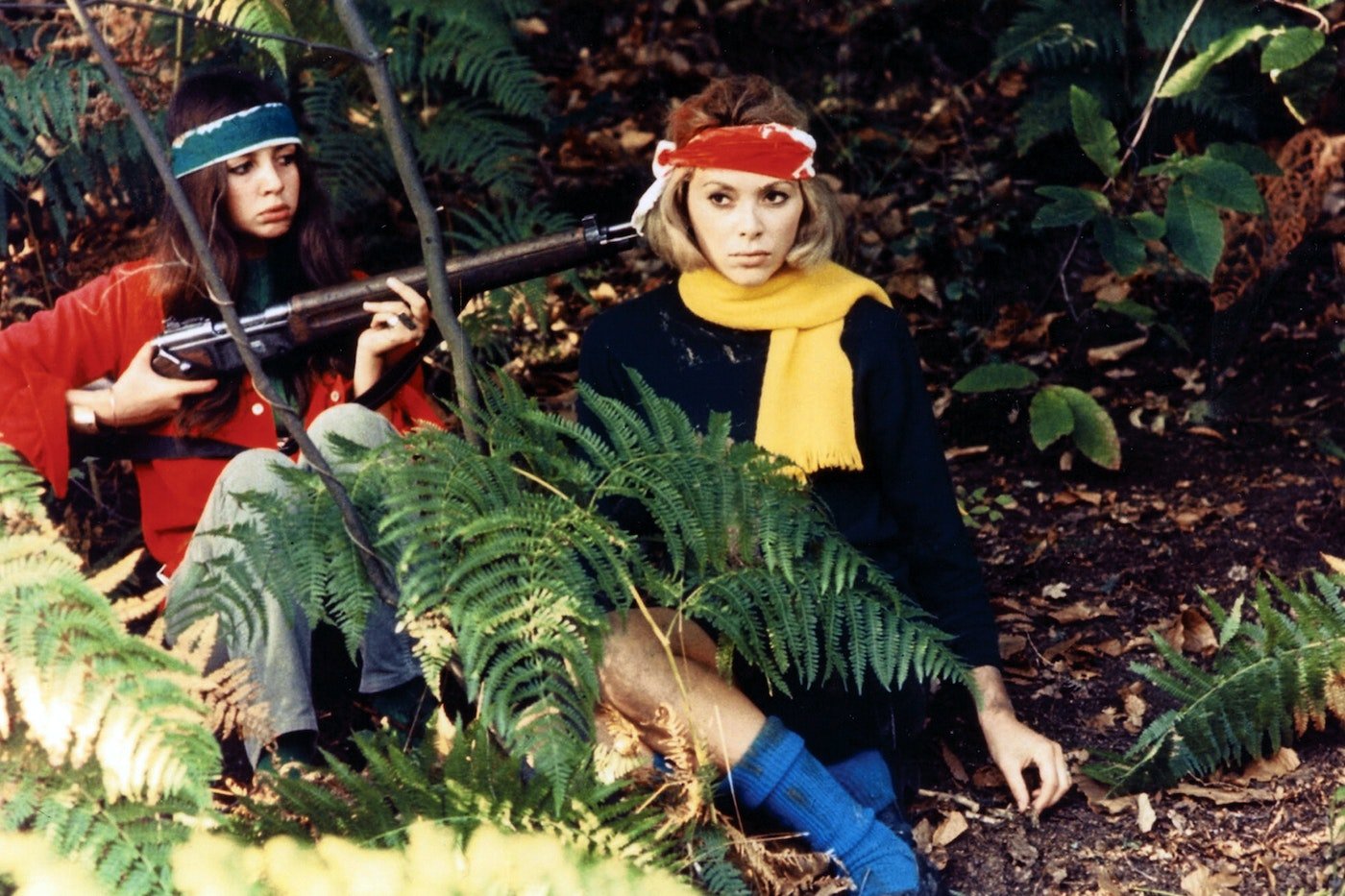
Grove Press/Photofest
94. Weekend
(1967) Dir: Jean-Luc Godard
A bourgeois married couple take a weekend road trip to collect their inheritance in this black comedy satirizing the 1960s and French society.
93. The World
(2004) Dir: Jia Zhangke
Following the lives of the young employees at Beijing World Park, this gloomy drama examines globalization’s influence on China’s working class.
92. The Tin Drum
(1979) Dir: Volker Schlöndorff
A three-year-old child in Danzig during the rise of the Nazi Party is disgusted by the adult world and decides to stop growing. Based on the novel by Günter Grass.
91. Syriana
(2005) Dir: Stephen Gaghan
Using multiple interlocking narratives, this slick thriller, starring George Clooney as CIA agent Bob Barnes, highlights the conspiracy and corruption of the global oil industry.
90. Investigation of a Citizen Above Suspicion
(1970) Dir: Elio Petri
A high-ranking police detective cuts the throat of his mistress and intentionally leaves behind evidence to see if he is immune to prosecution.
89. Salvador
(1986) Dir: Oliver Stone
Photojournalist Richard Boyle travels to El Salvador to document the country’s civil war in this fictionalized biographical drama. Try to forget what’s become of James Woods, who is excellent.
88. The Passion of Joan of Arc
(1928) Dir: Carl Theodor Dreyer
This timeless silent film based on actual historical records tells the story of the trial, conviction, and execution of Joan of Arc in 1431. Dreyer was one of the world’s most important early filmmakers.
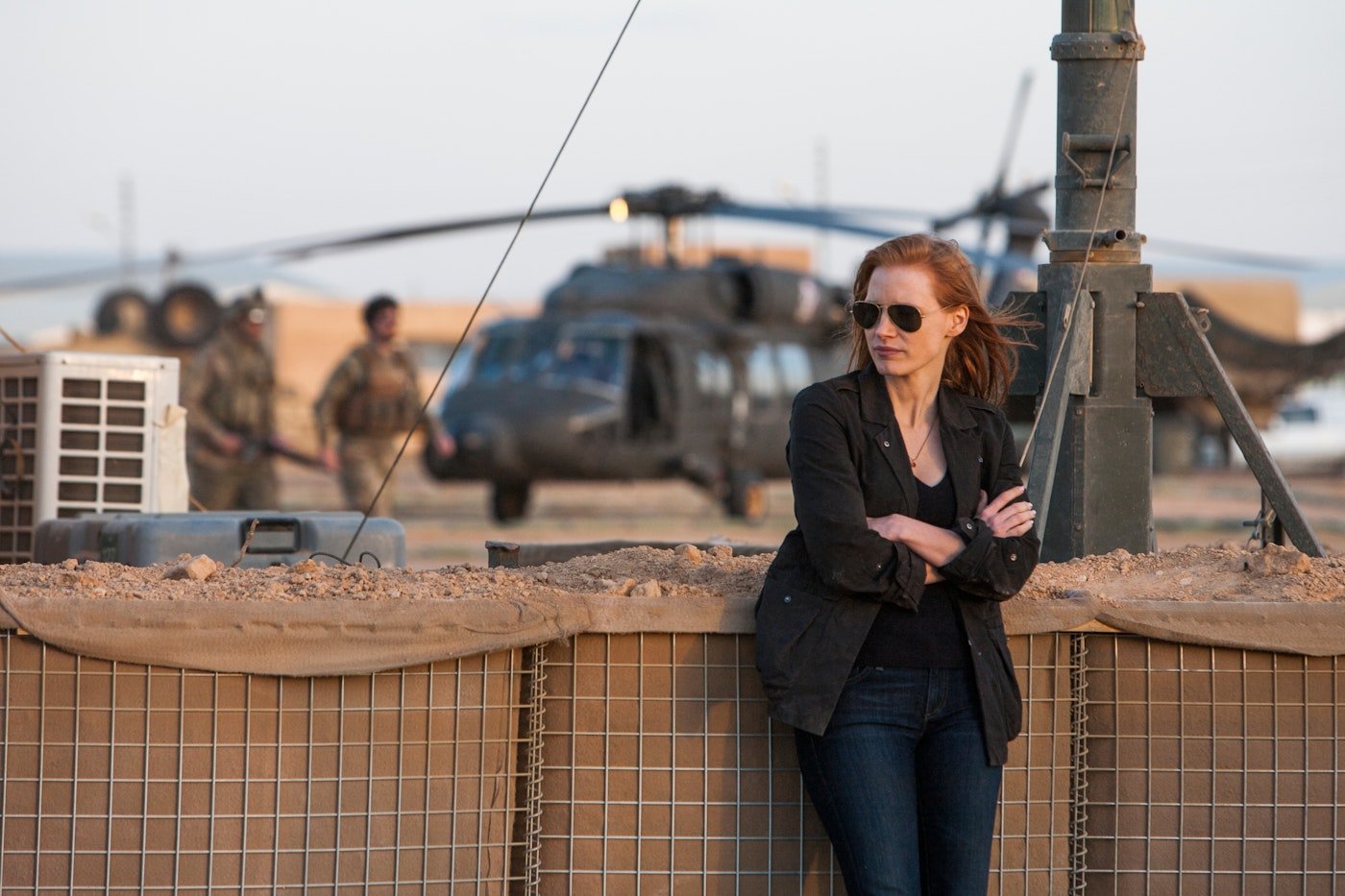
Everett Collection
87. Zero Dark Thirty
(2012) Dir: Kathryn Bigelow
A dramatized account of a CIA agent’s search for Osama bin Laden and the slaying of the Al Qaeda leader by Navy SEALs. Jessica Chastain’s performance won a Golden Globe.
86. Olympia
(1938) Dir: Leni Riefenstahl
The controversial documentary follows the 1936 games held in Nazi Germany, using multiple cameras and a range of innovative and distinctive techniques.
85. Ivan the Terrible, Part Two
(1958) Dir: Sergei Eisenstein
A follow-up on Russia’s infamous and violent first czar. Stalin liked part one. This one, featuring secret police and summary executions, not so much.
84. High and Low
(1963) Dir: Akira Kurosawa
An anonymous caller has mistakenly kidnapped the son of a wealthy executive’s chauffeur and holds him for 30 million yen in ransom. The Washington Post said this was Macbeth “if Macbeth had married better.”
83. Go, Go Second Time Virgin
(1969) Dir: Kôji Wakamatsu
In this experimental Japanese drama, two sexually traumatized teenagers meet on an apartment rooftop and open up about their troubled lives. A controversial entry in Japan’s “pink film” genre.
82. American Sniper
(2014) Dir: Clint Eastwood
Based on the memoir by Chris Kyle, the story follows the famed Navy SEAL sniper during his four tours in Iraq and how the war altered his life after. Its history of U.S. involvement in Iraq is … odd.
81. The Times of Harvey Milk
(1984) Dir: Rob Epstein
The story of the first openly gay man elected to public office in California, Harvey Milk, from his time as an activist with the Gay Rights Movement to his assassination. Murderer Dan White killed himself the year after this film was released.
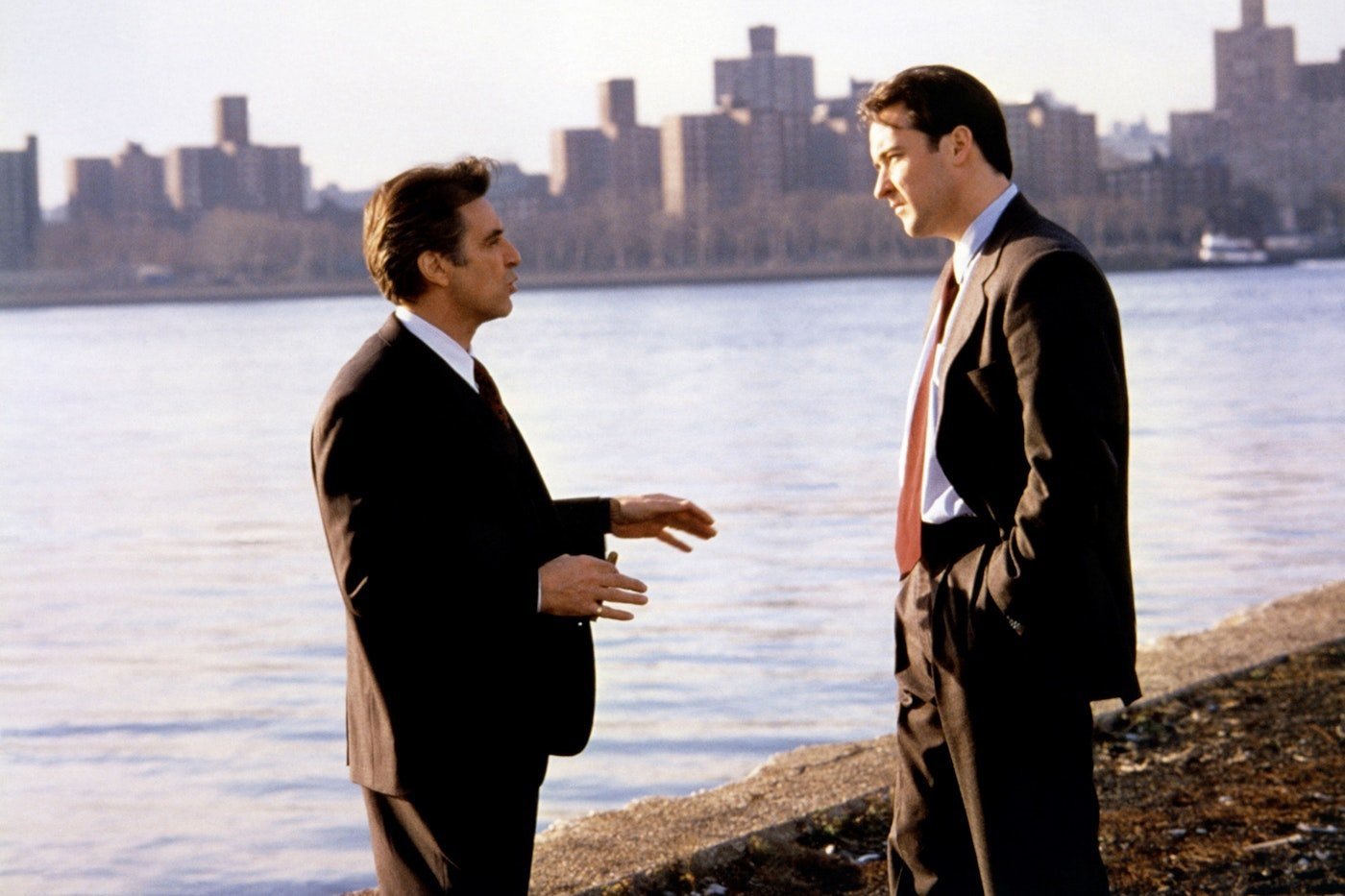
Columbia Pictures/Photofest
80. City Hall
(1996) Dir: Harold Becker
A deputy mayor, played by John Cusack (to Al Pacino’s mayor), investigates the killing of a six-year-old during a shootout between a cop and a mobster in New York City.
79. No
(2012) Dir: Pablo Larraín
A semi-fictional account of Chile’s 1988 referendum to decide whether dictator Augusto Pinochet would stay in power. It stars Gael García Bernal as the adman who leads the opposition campaign.
78. Eight Hours Don’t Make a Day
(1972) Dir: Rainer Werner Fassbinder
Broadcast in five episodes, this miniseries depicted contemporary working-class German life through the eyes of a young factory employee who falls in love and organizes with his co-workers.
77. A Short Film About Killing
(1988) Dir: Krzysztof Kieslowski
When a man murders a taxi driver in the Polish countryside, a young criminal defense lawyer tries to keep him from receiving the death penalty.
76. They Live
(1988) Dir: John Carpenter
A drifter in Los Angeles finds a pair of sunglasses that reveal the world’s ruling class as skull-faced aliens controlling humanity with subliminal messages: “Stay Asleep,” “Submit to Authority.” Sound like anyone you know?
75. Starship Troopers
(1997) Dir: Paul Verhoeven
In the twenty-third century, the human United Citizen Federation is at war with a race of alien insects from the planet Klendathu in this initially misunderstood satire of militarism and fascism.
74. Platform
(2000) Dir: Jia Zhangke
Following the death of Mao Zedong and in the shadow of the Cultural Revolution, an amateur theater troupe abandons state-approved performances and starts playing rock and roll.
73. Dogville
(2003) Dir: Lars von Trier
In this avant-garde film shot on a single soundstage, a woman on the run from gangsters takes shelter in a small Colorado town. It looks like no other film you’ve ever seen.
72. Three Days of the Condor
(1975) Dir: Sydney Pollack
When a paper-pushing analyst for the CIA discovers that his co-workers have been brutally murdered, he goes undercover to find the perpetrators. Redford and Dunaway: It didn’t get much better in the ’70s.
71. Being There
(1979) Dir: Hal Ashby
A naïve gardener in Washington, D.C., leaves his secluded life to explore the outside world, becoming a political adviser and celebrity. Based on the novel by Jerzy Kosiński.
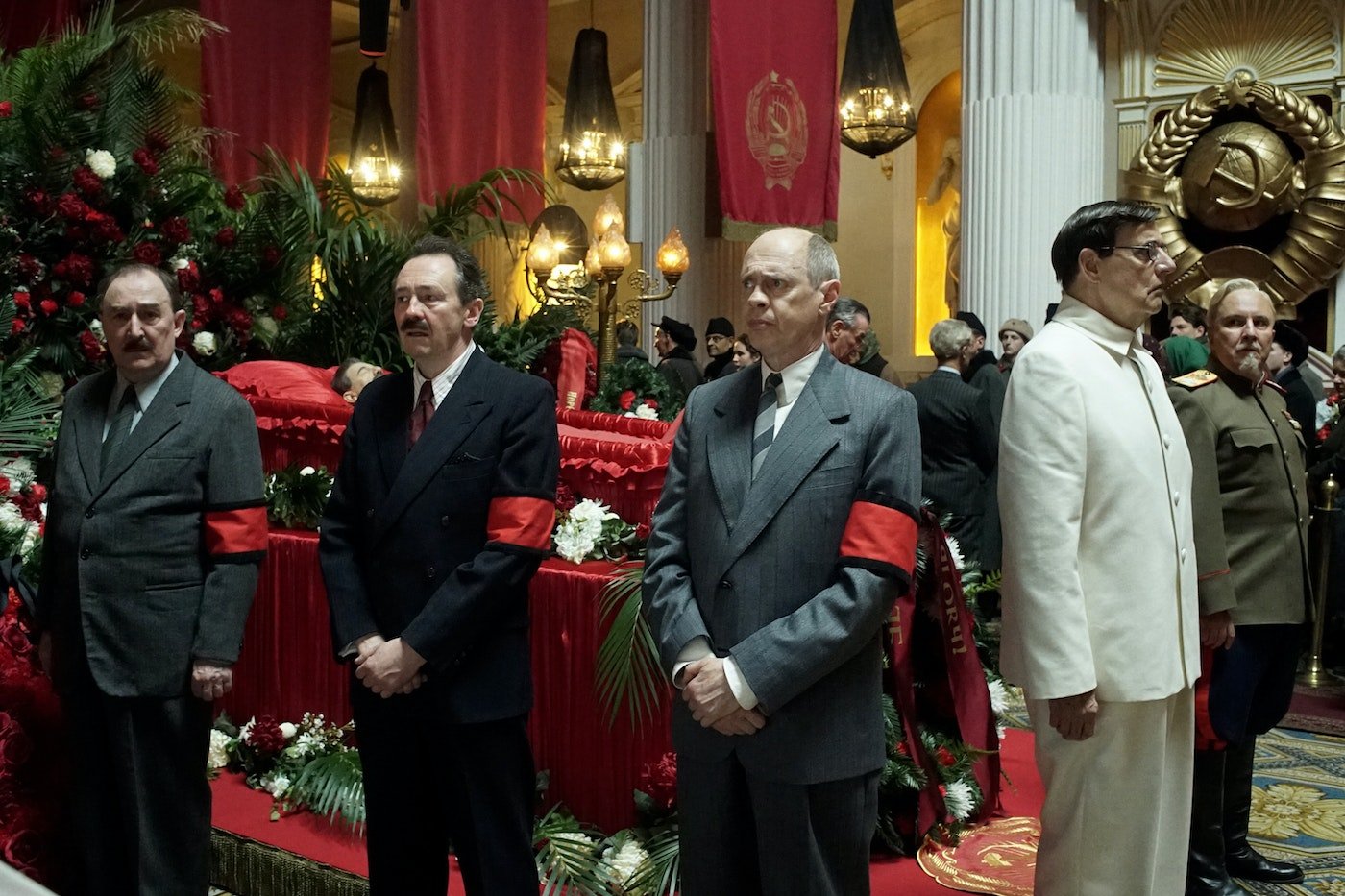
Photofest
70. The Death of Stalin
(2017) Dir: Armando Iannucci
After Soviet dictator Joseph Stalin unexpectedly dies from a stroke (well, most likely),members of the Central Committee fight for power in this satirical black comedy banned by the Russian Culture Ministry.
69. The Best Man
(1964) Dir: Franklin J. Schaffner
Written by Gore Vidal and based on his 1960 play, this drama follows two leading presidential candidates vying for their party’s nomination. Of its time, but a great cast keeps it moving.
68. Arsenal
(1929) Dir: Aleksandr Dovzhenko
A frontline Ukrainian soldier returns home to Kyiv after World War I to organize a workers’ uprising at the town’s arsenal. Number two in the trilogy (see number 61).
67. Point of Order!
(1964) Dir: Emile de Antonio
Using only television footage from the 1954 Army-McCarthy hearings, this documentary is a stunning insight into the downfall of the corrupt, anti-Communist senator. “Have you no sense of decency?” will live forever.
66. The Sorrow and the Pity
(1969) Dir: Marcel Ophüls
This stunning two-part documentary examines the French people’s collaboration and resistance during Nazi occupation in World War II. The witness-interview format, now well-worn, was still new in 1969.
65. The Emperor’s Naked Army Marches On
(1987) Dir: Kazuo Hara
After the end of World War II, Kenzō Okuzaki, a former Imperial Japanese private, searches for and interrogates the officers involved in the execution of two of his fellow soldiers. Forty-two years after the war’s end, but worth the wait.
64. The American President
(1995) Dir: Rob Reiner
Written by Aaron Sorkin, this romance stars Michael Douglas as a widowed president running for reelection who falls in love with an environmental lobbyist—despite his staffers’ objections. That rare genre: a political rom-com.
63. Lumumba: Death of a Prophet
(1991) Dir: Raoul Peck
A bracing documentary on the life and mysterious death of Lumumba, the prime minister of the Congo and a monumental figure in the fight for African independence before his assassination in 1961.
62. Khrustalyov, My Car!
(1998) Dir: Aleksey German
This hallucinatory black-and-white Russian comedy-drama is set in the winter of 1953, guiding us through the horrifying final days of Joseph Stalin’s reign.
61. Earth
(1930) Dir: Aleksandr Dovzhenko
In a Ukrainian village, peasant farmers begin collectivizing with the help of a tractor in the final film of Dovzhenko’s “Ukraine Trilogy.” Certainly relevant right now.
60. Love and Anarchy
(1973) Dir: Lina Wertmüller
In the 1930s, an anarchist farmer in Italy begins living in a brothel while preparing to assassinate Benito Mussolini after his friend is killed by the fascist police.
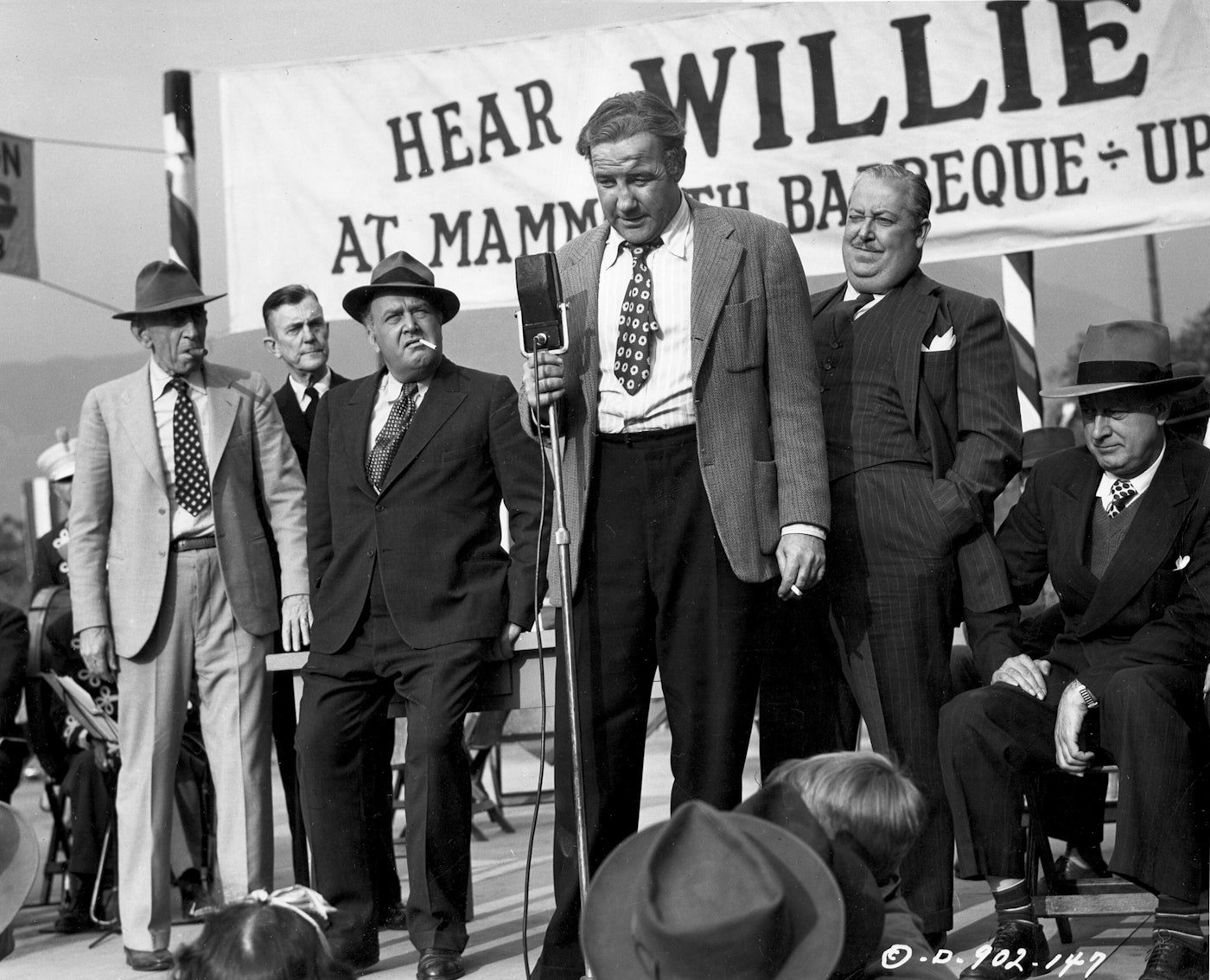
Photofest
59. All the King’s Men
(1949) Dir: Robert Rossen
An ambitious populist politician is corrupted by power after being elected governor. Based on the Pulitzer-winning novel by Robert Penn Warren. Huey Long remains the only prominent social democratic fascist America has ever produced.
58. I Am Not Your Negro
(2016) Dir: Raoul Peck
Narrated by Samuel L. Jackson and based on James Baldwin’s unfinished manuscript, this astonishing documentary reflects on the lives of Medgar Evers, Martin Luther King Jr., Malcolm X, and Baldwin himself.
57. The Last Hurrah
(1958) Dir: John Ford
An old-school Irish American mayor in New England tries to run for a fifth—and final—term. Ford gets mawkish here; Spencer Tracy keeps it real.
56. The Fog of War
(2003) Dir: Errol Morris
Robert McNamara, former secretary of defense under Presidents Kennedy and Johnson, discusses his life and lessons learned in this confessional documentary. His reputation—already hurting—took a big hit here.
55. Grand Illusion
(1937) Dir: Jean Renoir
When their plane is shot down during a reconnaissance mission, two French soldiers are sent to a World War I German prison camp, but the pair work with their fellow inmates to plot an escape. Goebbels ordered the destruction of every print of the film.
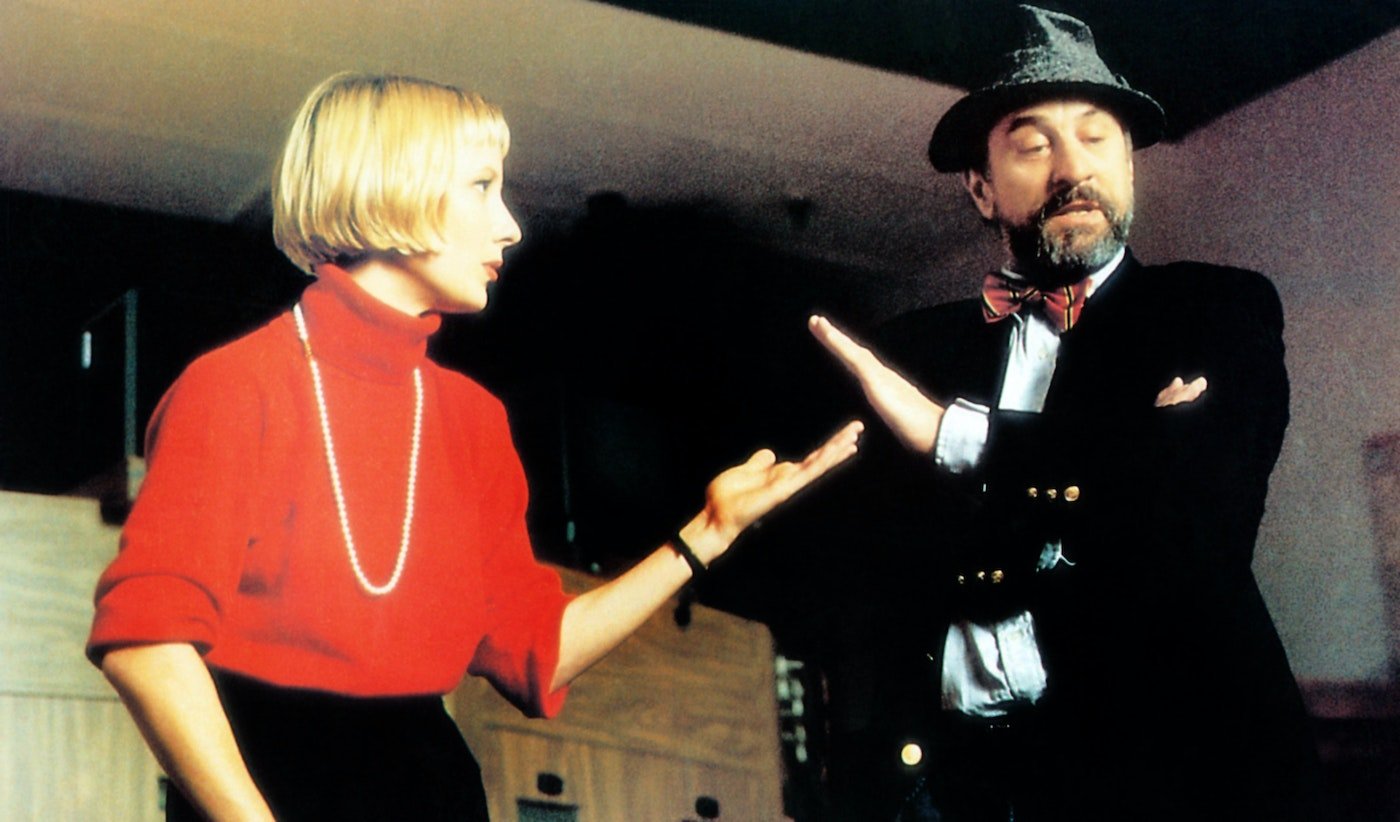
Everett Collection
54. Wag the Dog
(1997) Dir: Barry Levinson
As the president prepares for reelection, a political spin doctor and a famous Hollywood producer manufacture a fake war with Albania to distract the public from an impending sex scandal. A poorly timed release from the perspective of Bill Clinton, who was accused—wrongly—of doing the same in Iraq.
53. Nazi Concentration and Prison Camps (shown at the Nuremberg trials)
(1945) Dir: George Stevens
After the end of World War II, this footage was presented at the war crime trials of Nazi leaders. The evidence included film from Germans as well as the Allied troops who liberated the concentration camps. Stevens, known for comedies in the 1930s, shifted to drama after seeing what happened in Dachau.
52. Bicycle Thieves
(1948) Dir: Vittorio De Sica
A working-class man and his eight-year-old son search the streets of Rome for a stolen bicycle in this neorealist Italian drama. A searing depiction of the state in which Mussolini and his fascists left their country.
51. The Act of Killing
(2012) Dir: Joshua Oppenheimer
In this documentary, decades after the mass murders of civilians by the Indonesian military, the leaders of the death squads reenact the killings—often with a bone-chilling casualness—using their favorite movie genres.
50. Punishment Park
(1971) Dir: Peter Watkins
In this pseudo-documentary, President Nixon declares a state of emergency and has political radicals arrested. Put before a tribunal, the rebels are given two options: prison or their participation in a brutal military training exercise.
49. Come and See
(1985) Dir: Elem Klimov
An adolescent Belarusian boy finds a rifle and joins the Soviet resistance during World War II to fight against the occupying Nazi forces. Things get even worse when he returns home.
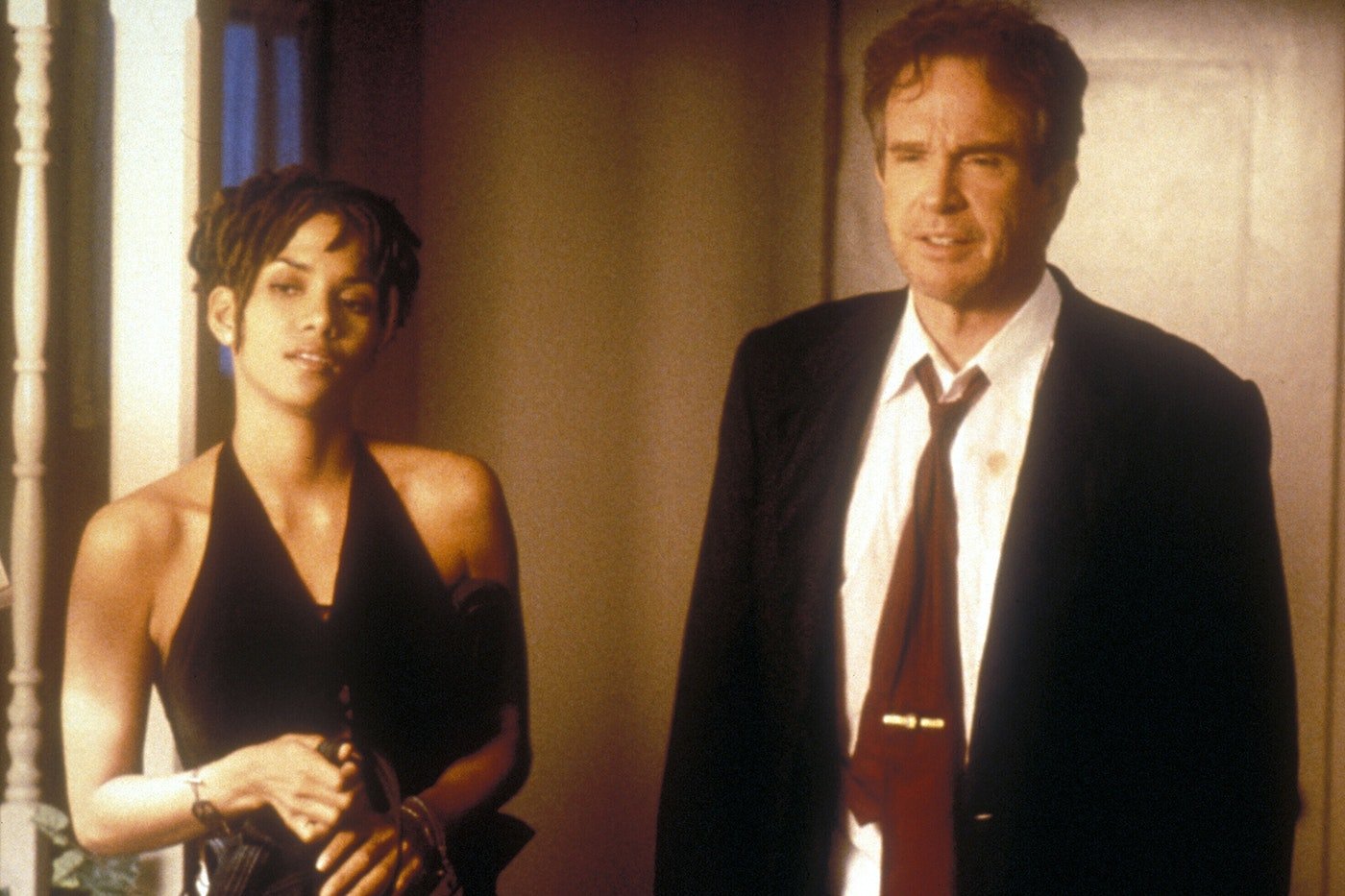
Twentieth Century Fox/Photofest
48. Bulworth
(1998) Dir: Warren Beatty
An incumbent California senator facing a tough primary battle takes out a $10 million life insurance policy before putting a contract out on himself. With days left to live, he finally starts to speak his mind. Seen at the time as a dark commentary on Clintonian triangulation.
47. The Parallax View
(1974) Dir: Alan J. Pakula
After a senator and presidential candidate is assassinated, the witnesses are quickly killed off, leading a journalist to go undercover and investigate the conspiracy. Part of Pakula’s famous Paranoia Trilogy from the 1970s.
46. Medium Cool
(1969) Dir: Haskell Wexler
Using real footage from the 1968 riots in Chicago, the famed cinematographer’s directorial debut depicts an unfeeling television cameraman amid the social upheaval surrounding the Democratic National Convention.
45. All Quiet on the Western Front
(1930) Dir: Lewis Milestone
Based on the novel by Erich Maria Remarque, this film follows a group of naïve German recruits fighting in the bloody and horrific front lines of World War I. A bold antiwar statement for 1930.
44. Duck Soup
(1933) Dir: Leo McCarey
The dictator of the fictional nation of Freedonia declares war on a neighboring country in this slapstick comedy starring the Marx Brothers. Featuring Groucho’s unforgettable couplet: “If you think this country’s bad off now, just wait ’til I get through with it!”
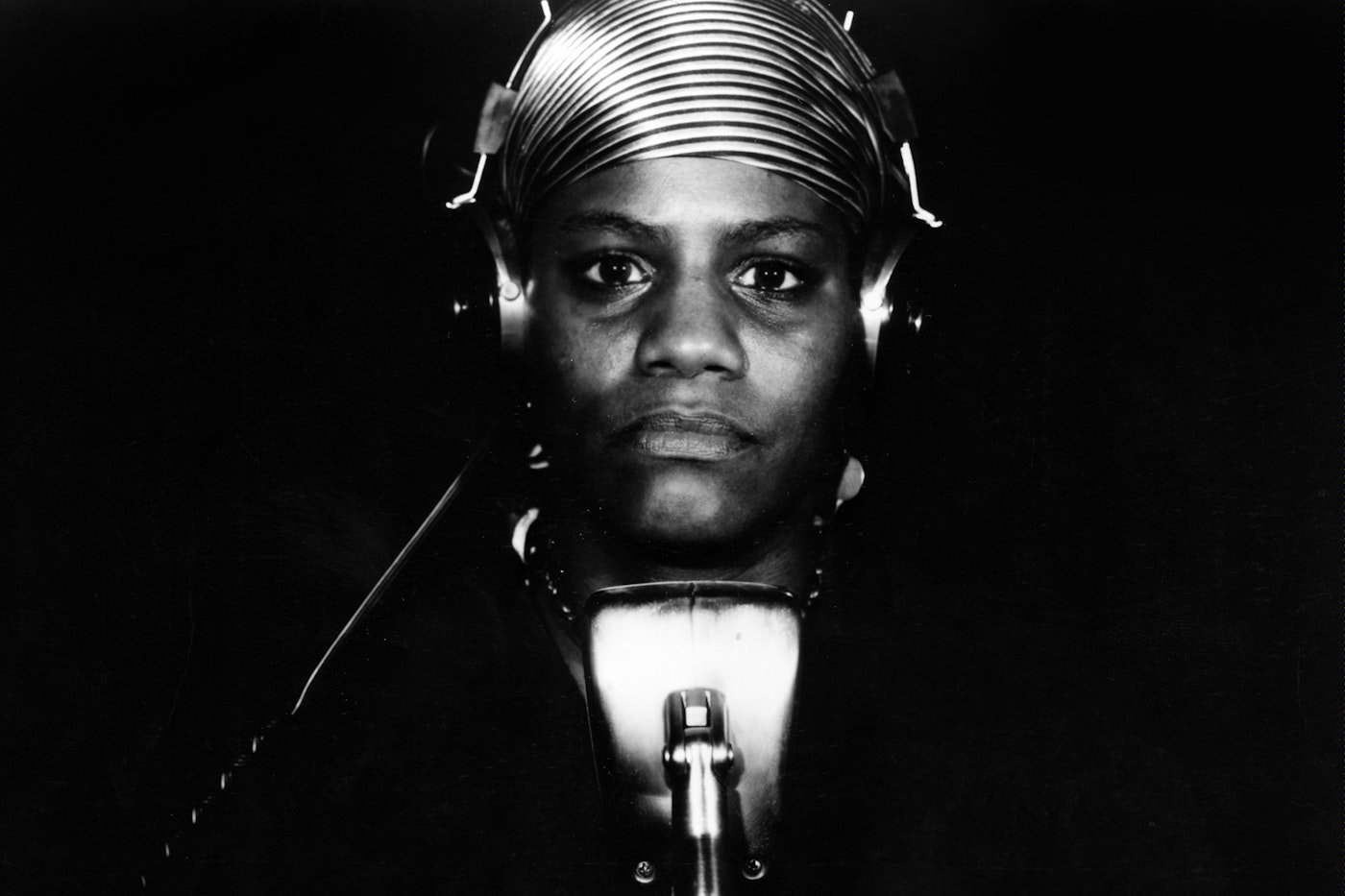
First Run Features/Photofest
43. Born in Flames
(1983) Dir: Lizzie Borden
Set in a dystopian New York City a decade after a peaceful socialist revolution, this film follows a group of feminist organizers after an activist is killed in police custody.
42. Man of Marble
(1977) Dir: Andrzej Wajda
In what is considered one of Poland’s greatest movies, a film student attempts to track down Mateusz Birkut, a bricklayer turned Communist hero, for her university thesis.
41. Reds
(1981) Dir: Warren Beatty
Beatty’s masterwork, a historical drama about the life of the idealistic journalist John Reed, who documented the Bolshevik Revolution in Russia. And Jack Nicholson as Eugene O’Neill? It works.
40. The Spook Who Sat by the Door
(1973) Dir: Ivan Dixon
A Black man joins the CIA to learn guerrilla warfare techniques, then resigns to train freedom fighters in Chicago. Based on the novel by Sam Greenlee.
39. Hearts and Minds
(1974) Dir: Peter Davis
Released shortly after American withdrawal, this groundbreaking documentary examined the U.S. military involvement in the Vietnam War over the course of five presidential administrations.
38. Primary
(1960) Dir: Robert Drew
Presidential candidates John F. Kennedy and Hubert H. Humphrey are followed behind the scenes in Wisconsin as they compete for the Democratic Party primary nomination. One of the first of its kind.
37. The Murder of Fred Hampton
(1971) Dir: Howard Alk
A documentary about the life of the 21-year-old leader of the Illinois Black Panther Party and his murder by the Chicago Police Department. The film vigorously challenged the official police testimony.
36. Jeanne Dielman, 23 quai du Commerce, 1080 Bruxelles
(1975) Dir: Chantal Akerman
A widowed mother living in a small Brussels apartment has a mundane life—cooking, cleaning, shopping, and having sex to pay the bills—until she slowly starts to stray from her routine. A feminist tour de force.
35. Night of the Living Dead
(1968) Dir: George A. Romero
In what is considered the first modern zombie film, a group barricades themselves in a rural western Pennsylvania farmhouse as the dead are reanimated to hunt for human flesh, with a real-life Pittsburgh TV personality doing on-the-scene reporting. Political? Call it allegorical.
34. JFK
(1991) Dir: Oliver Stone
A highly sensationalized but absorbing retelling of the investigation of John F. Kennedy’s assassination, exploring—nay, endorsing—the conspiracy theories and an alleged government cover-up.
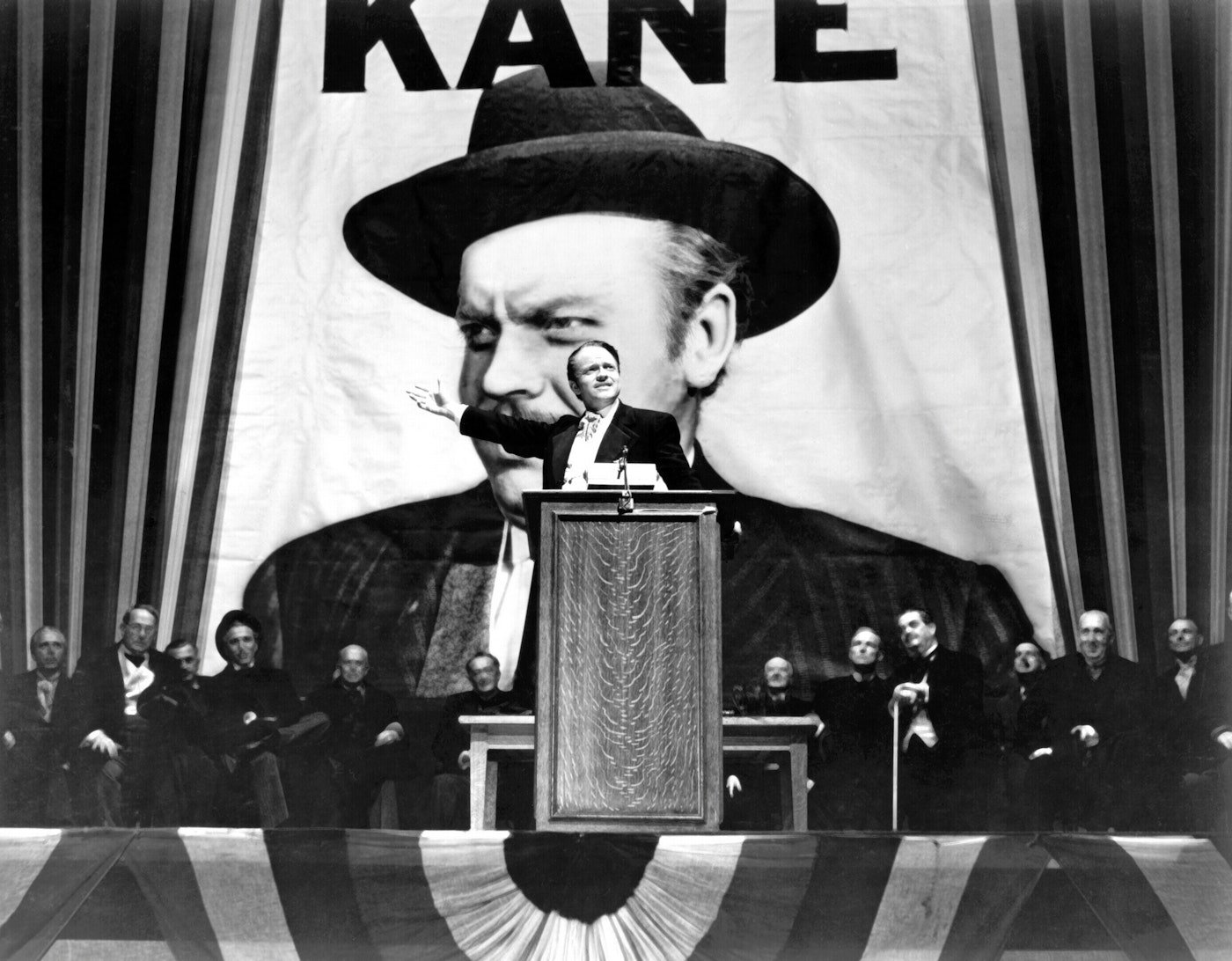
RKO RADIO/PHOTOFEST
33. Citizen Kane
(1941) Dir: Orson Welles
Frequently cited as one of the best films ever made—and Welles’s first—the fictional biography centers on the life of wealthy newspaper magnate Charles Foster Kane and the mystery of his last word before dying. Still hard to think of a better American film.
32. The Hour of the Furnaces
(1968) Dir: Octavio Getino & Fernando E. Solanas
A polemical three-part documentary exploring the history of colonialism, class struggle, and liberation in Argentina and the rest of Latin America. Perhaps the paradigmatic “Third World” leftist film.
31. Salt of the Earth
(1954) Dir: Herbert Biberman
Created after the director, producer, and screenwriter were all blacklisted by the House Un-American Activities Committee, the film is a dramatization of the Empire Zinc mine workers strike in New Mexico. The film, too, was blacklisted.
30. Gabriel Over the White House
(1933) Dir: Gregory La Cava
Walter Huston is an uninterested president who pledges to solve the issues of the Great Depression after a near-fatal car accident and divine intervention inspire him to become a populist dictator. William Randolph Hearst helped finance this fantasy.
29. The Great McGinty
(1940) Dir: Preston Sturges
Dan McGinty escapes a life of poverty to become a henchman for a crooked political boss (Akim Tamiroff, one of the great cinematic sidemen of the golden age). But his meteoric rise is threatened once he develops a conscience.
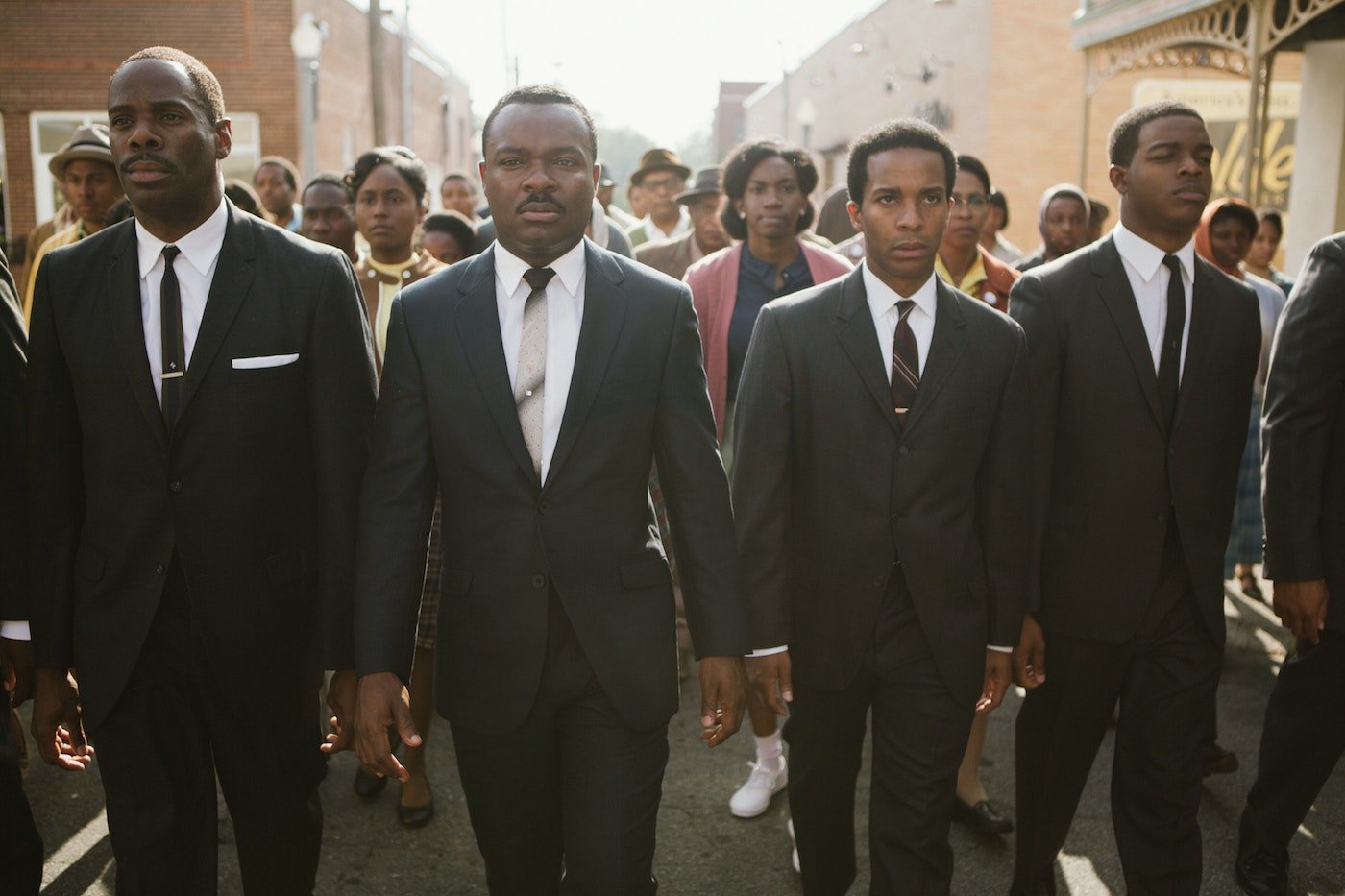
Paramount Pictures/Photofest
28. Selma
(2014) Dir: Ava DuVernay
A poignant portrayal of the 1965 Selma Marches led by Dr. Martin Luther King Jr. and the nonviolent campaign to grant Black Americans their right to vote. David Oyelowo is a spellbinding King.
27. Memories of Underdevelopment
(1968) Dir: Tomás Gutiérrez Alea
After his wife and family flee to Miami following the Bay of Pigs invasion, a wealthy Cuban writer stays behind to reflect on the history and transformation of both his country and himself. The most celebrated work in the history of Cuban cinema.
26. The Great Dictator
(1940) Dir: Charlie Chaplin
Charlie Chaplin, in a dual role, plays both a fascist modeled after Adolf Hitler and a Jewish barber suffering from amnesia in this biting satire of autocracy. His first full-blown talkie.
25. Strike
(1924) Dir: Sergei Eisenstein
An early and emblematic work of Soviet cinema, this silent film depicts the ultimately unsuccessful revolt by factory workers in prerevolutionary Russia.
24. Lincoln
(2012) Dir: Steven Spielberg
The sixteenth president attempts to formally abolish slavery while facing opposition from his own party and increased pressure to end the Civil War. Daniel Day-Lewis is captivating, as is the dark, dusty Washington that Spielberg creates.
23. Advise & Consent
(1962) Dir: Otto Preminger
When the president nominates a man with a reddish background to be secretary of state, the Senate … does what the Senate does. Amazingly frank for 1962, right down to the Greenwich Village gay bar scene.
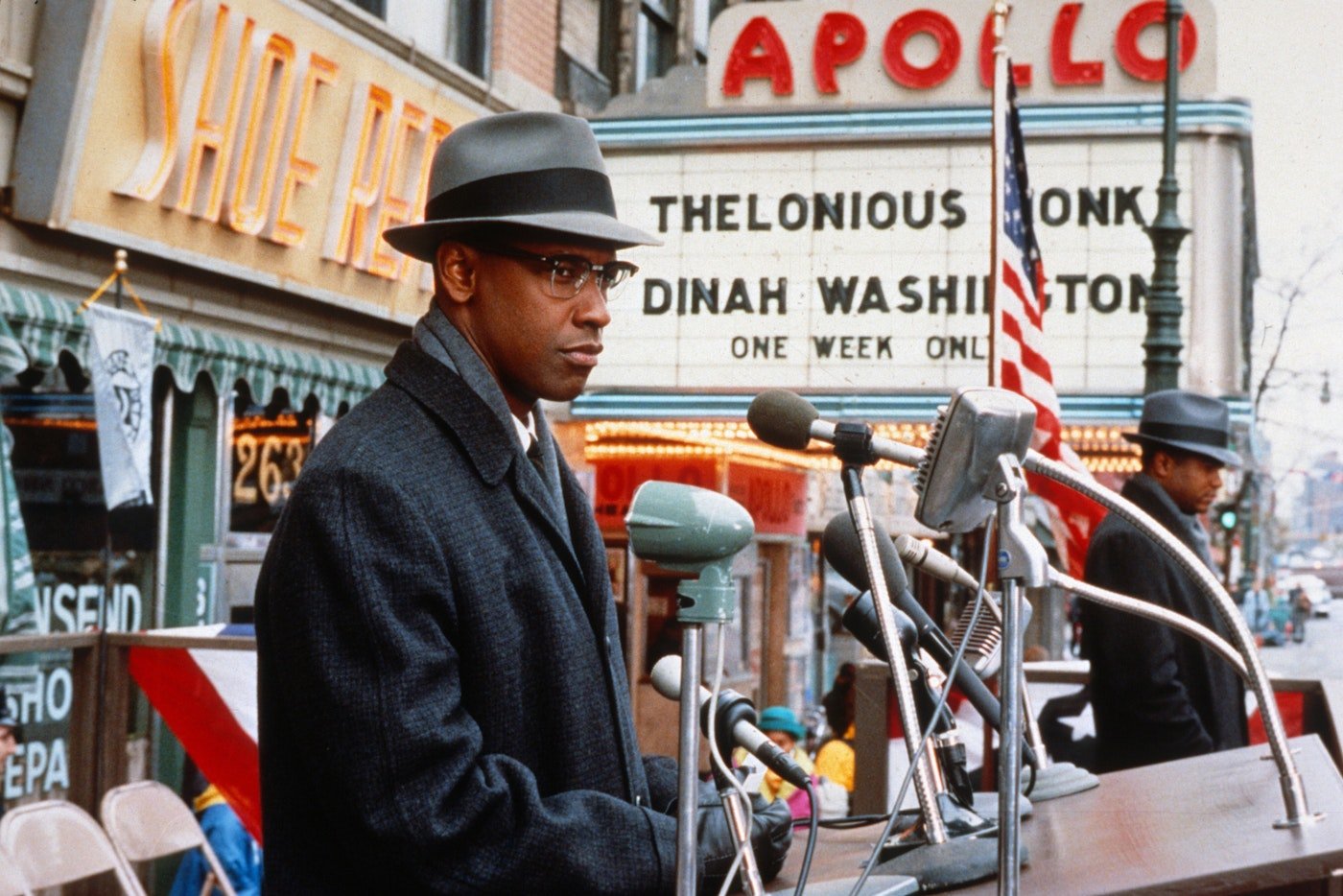
WARNER BROS./PHOTOFEST
22. Malcolm X
(1992) Dir: Spike Lee
A tribute to the life and legacy of the civil rights leader, stretching from his teenage years in Boston to his spiritual journey and fight for Black liberation. Probably Denzel’s best performance.
21. Night and Fog
(1955) Dir: Alain Resnais
Filmed a decade after World War II, this haunting documentary uses footage of the abandoned Auschwitz and Majdanek concentration camps alongside archival documents to force viewers to confront the horrific atrocities committed by Nazi Germany.
20. The Candidate
(1972) Dir: Michael Ritchie
Left-wing lawyer Bill McKay runs a long-shot campaign for the U.S. Senate against the popular Republican incumbent—trying not to lose his ideals and integrity in the process. One of the great last lines of any movie.
19. The Lives of Others
(2006) Dir: Florian Henckel von Donnersmarck
Set in the 1980s, this German drama tells the story of a morally conflicted Stasi agent spying on two East German residents, a playwright and an actress.
18. The Battle of Chile
(1975-1979) Dir: Patricio Guzmán
A documentary series released in three parts from 1975 to 1979, chronicling the political repression and counterrevolution after the military coup d’état against the Allende government.
17. La Commune (Paris, 1871)
(2000) Dir: Peter Watkins
At over five hours long, this historical reenactment—filmed in the style of a documentary—depicts the events of the Paris Commune in 1871 as if modern-day television were there to capture them.

Paramount Pictures/Photofest
16. Election
(1999) Dir: Alexander Payne
A high school teacher meddles in a student body presidential election in order to stop a particularly cunning student from winning. Tracy Flick will endure forever as one of the great names in cinema.
15. Z
(1969) Dir: Costa-Gavras
A riveting, fictionalized account of the 1963 assassination of a left-wing Greek politician—and the conspiracy behind it—when he is killed in what seems like a traffic accident. Costa-Gavras wrote the screenplay with Jorge Semprún.
14. The Conformist
(1970) Dir: Bernardo Bertolucci
An Italian fascist becomes a government agent and is sent to assassinate his former professor, his onetime leftist mentor. Based on the novel by Alberto Moravia.
13. La Chinoise
(1967) Dir: Jean-Luc Godard
In a loose adaptation of Demons by Fyodor Dostoevsky, the film follows a group of young Maoist student activists in Paris organizing a revolution. Visually stunning; politically … of its time.
12. Harlan County U.S.A.
(1976) Dir: Barbara Kopple
This gripping documentary covered the 1973 Brookside Strike by a coal mining community in rural Kentucky against a subsidiary of the Duke Power Company. Way back before places like this became Trump Country.
11. Mr. Smith Goes to Washington
(1939) Dir: Frank Capra
Capra was just the right director—and Jimmy Stewart just the right hero—for this fantasy about good actually triumphing over corruption on Capitol Hill. This one never gets old.
(United States, 1957) DIR: Elia Kazan
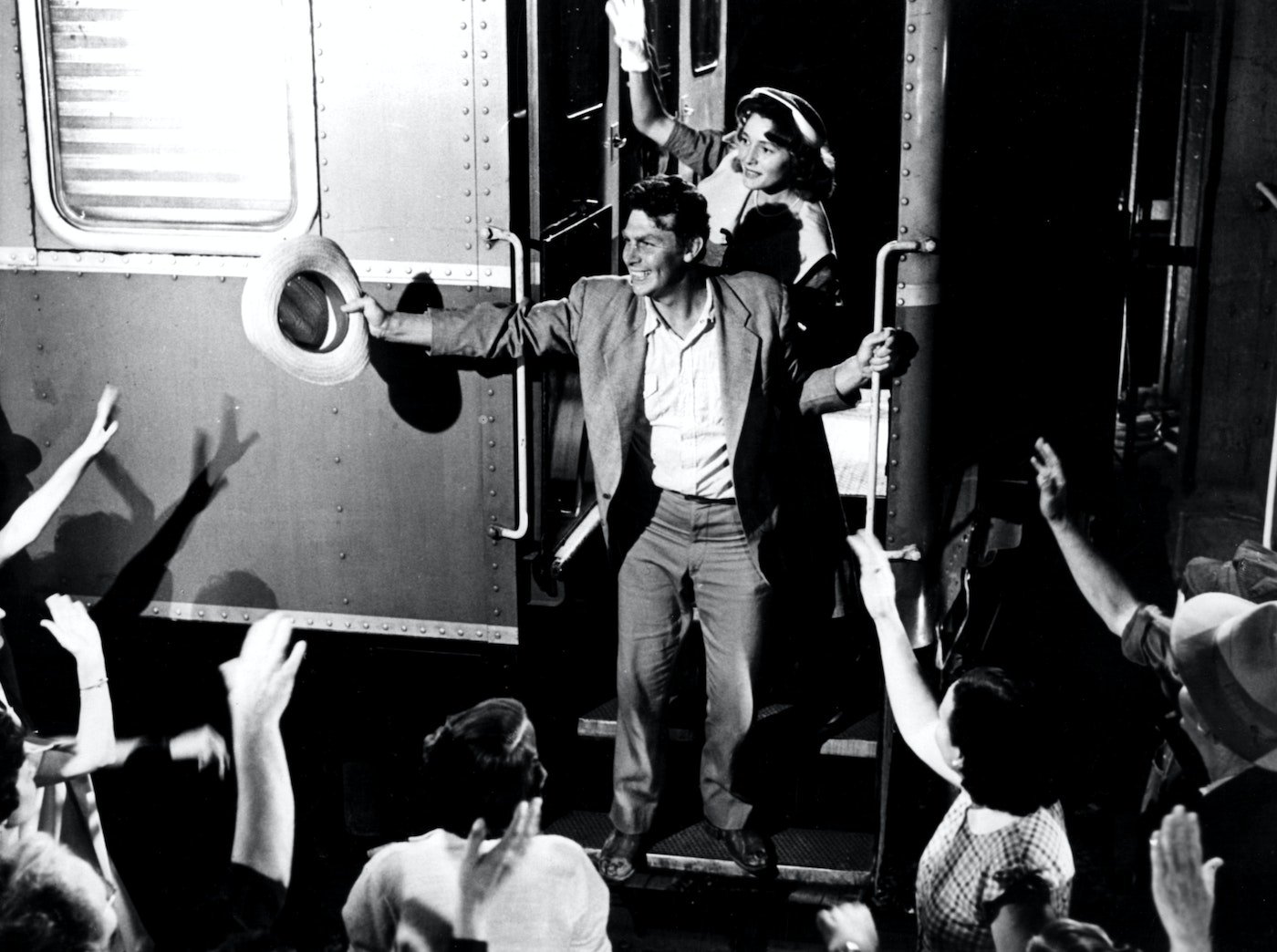
Everett Collection
In the midst of the Cold War, Elia Kazan and Budd Schulberg collaborated on a warning—not about alien invaders or the threat of nuclear war, but about the dangers posed by the American media. The rise and fall of the down-home demagogue Larry “Lonesome” Rhodes (part Huey Long, part Elvis, part Madison Avenue huckster) has long since ceased to be a cautionary warning and become a fact of American life: the specter of entertainment come to power.
(France, 1985) DIR: Claude Lanzmann
At nine-and-a-half hours, Lanzmann’s monument to the murdered Jews of Europe refuses to reconstruct the past. The movie is notable for its rigor—eschewing archival footage and narration in favor of contemporary landscapes and long interviews (shown mainly in real time) with those who in one form or another experienced the Holocaust. As ethical as Shoah is, I hadn’t thought of it as a political film, but then again, a well-known critic once told me it was Israeli propaganda.
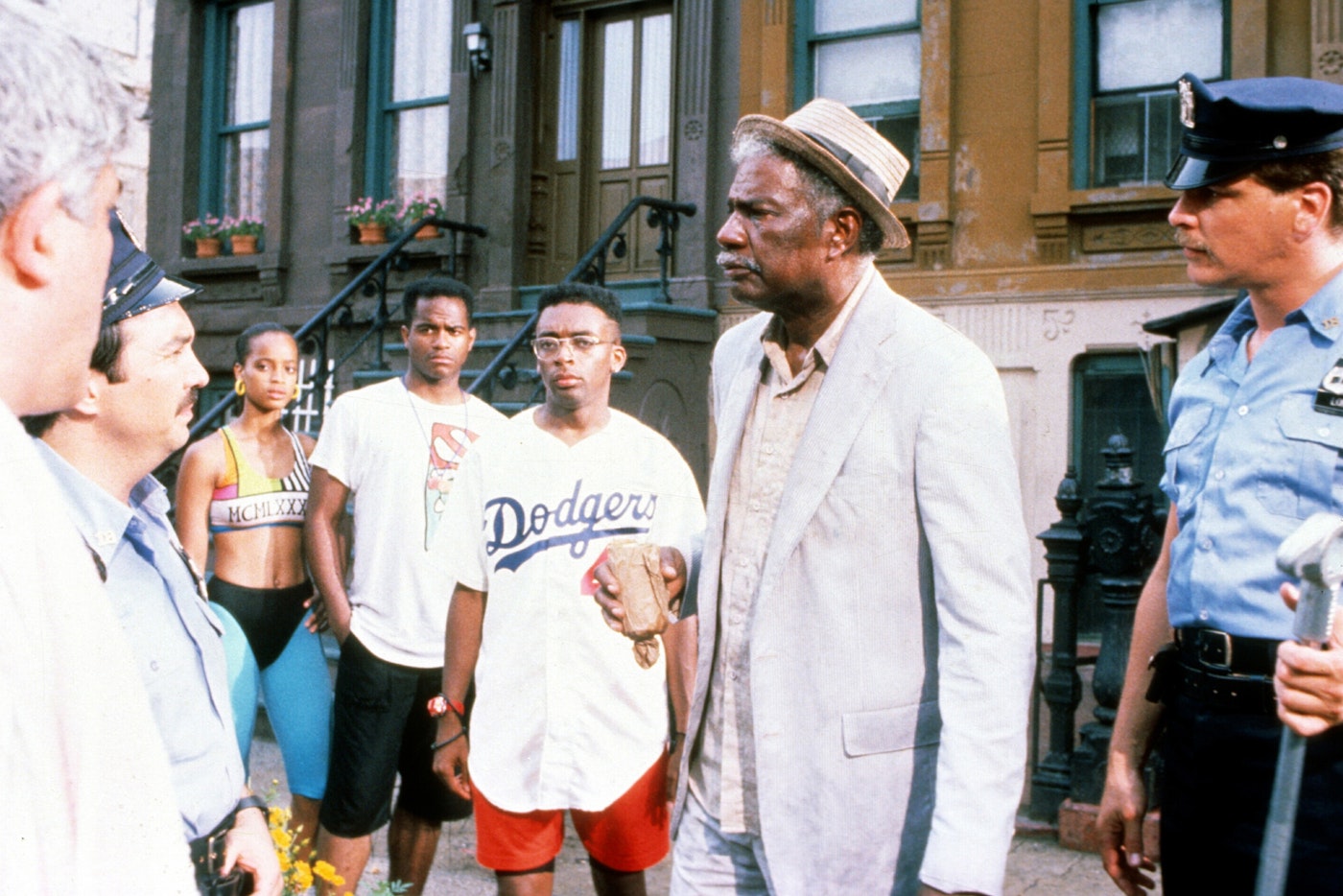
Photofest
(United States, 1989) DIR: Spike Lee
Set in the heart of Brooklyn on the hottest Saturday of the summer, Lee’s daring mixture of naturalism and allegory, agitprop and psychodrama, broke ground with its outspoken discussion of race and urban tension. Everyone in the large cast of characters has their individual perspective, and everyone mixes it up with everyone else. No one watching can avoid having a point of view. Do the Right Thing is uniquely confrontational in addressing racism and racial violence while refusing to take an unambiguous stance for (white) civil order.
(USSR, 1925) DIR: Sergei Eisenstein
Commissioned to mark the twentieth anniversary of the failed 1905 revolution against the czar, Eisenstein’s second feature film—dramatizing a mutiny on a Black Sea battleship—is the fullest example of what, in opposition to Dziga Vertov’s “kino-eye,” Eisenstein called his “kino-fist.” Time and space are pulverized and reassembled. The notorious “Odessa Steps” sequence has never been surpassed for dynamic montage, nor has the film been bettered as a political rabble-rouser. Everybody, including Nazis, wanted one. (They got Triumph of the Will.)
(Germany, 1935) DIR: Leni Riefenstahl
The Birth of a Nation uses drama to contaminate, personalize, and rewrite history. No less accomplished, formally innovative, or intermittently exciting than Birth and even more steeped in the magic of the movies, Riefenstahl’s staged documentary of the 1934 Nazi Party Congress demonstrates how cinema can be used to frame an event and fabricate an idol—in this case the twentieth century’s foremost homicidal psychopath. Griffith was a sincere revanchist; Riefenstahl, more sophisticated, took refuge in her opportunism.
(United States, 1915) DIR: D.W. Griffith
American cinema was born in sin, founded on an unprecedented three-hour historical spectacle with an unscrupulous political agenda. “The task I’m trying to achieve, above all, is to make you see,” Griffith announced, by which he meant to overwhelm the spectator into recognizing the nobility of the white supremacist antebellum South—not to mention appreciate the horror of Reconstruction and root for the terrorism of the Ku Klux Klan. A groundbreaking film in many ways, The Birth of a Nation is also the most inflammatory and dangerous movie ever made in the United States. It rewrote history but cannot itself be written out or wished away.
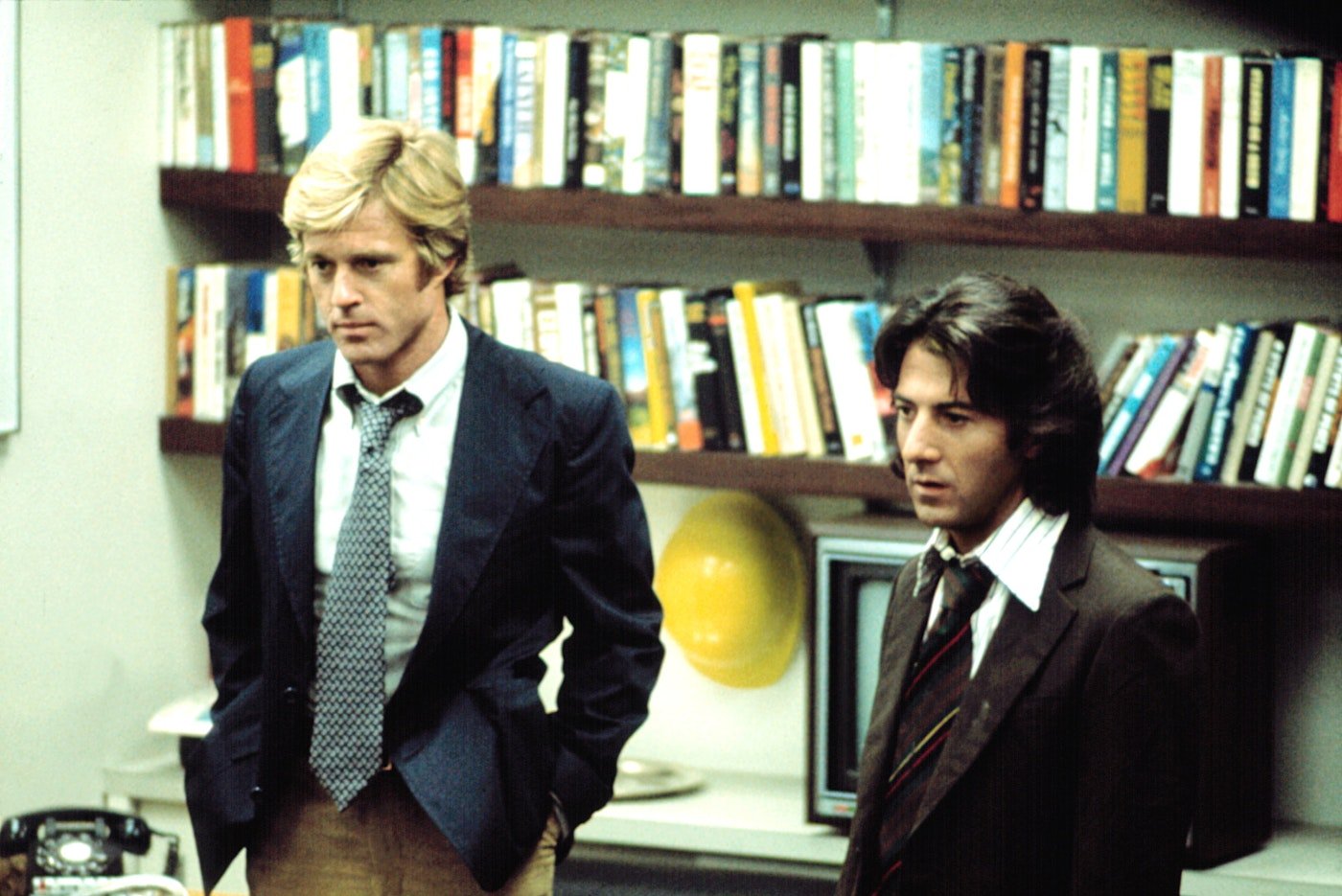
Everett Collection
(United States, 1976) DIR: Alan J. Pakula
Two Washington Post reporters, helped by a mysterious source, single-handedly break the Watergate story and oust Richard Nixon from the White House. More a celebration of investigative journalism than of American democracy, All the President’s Men was released to coincide with the Bicentennial and supplanted Frank Capra’s Mr. Smith Goes to Washington as the most positive of American political movies. Like the Capra film, however, Pakula’s stirring thriller is a relic of a less cynical time. A contemporary equivalent would be that perennial favorite of politicians from Rudy Giuliani to Fidel Castro, The Godfather.
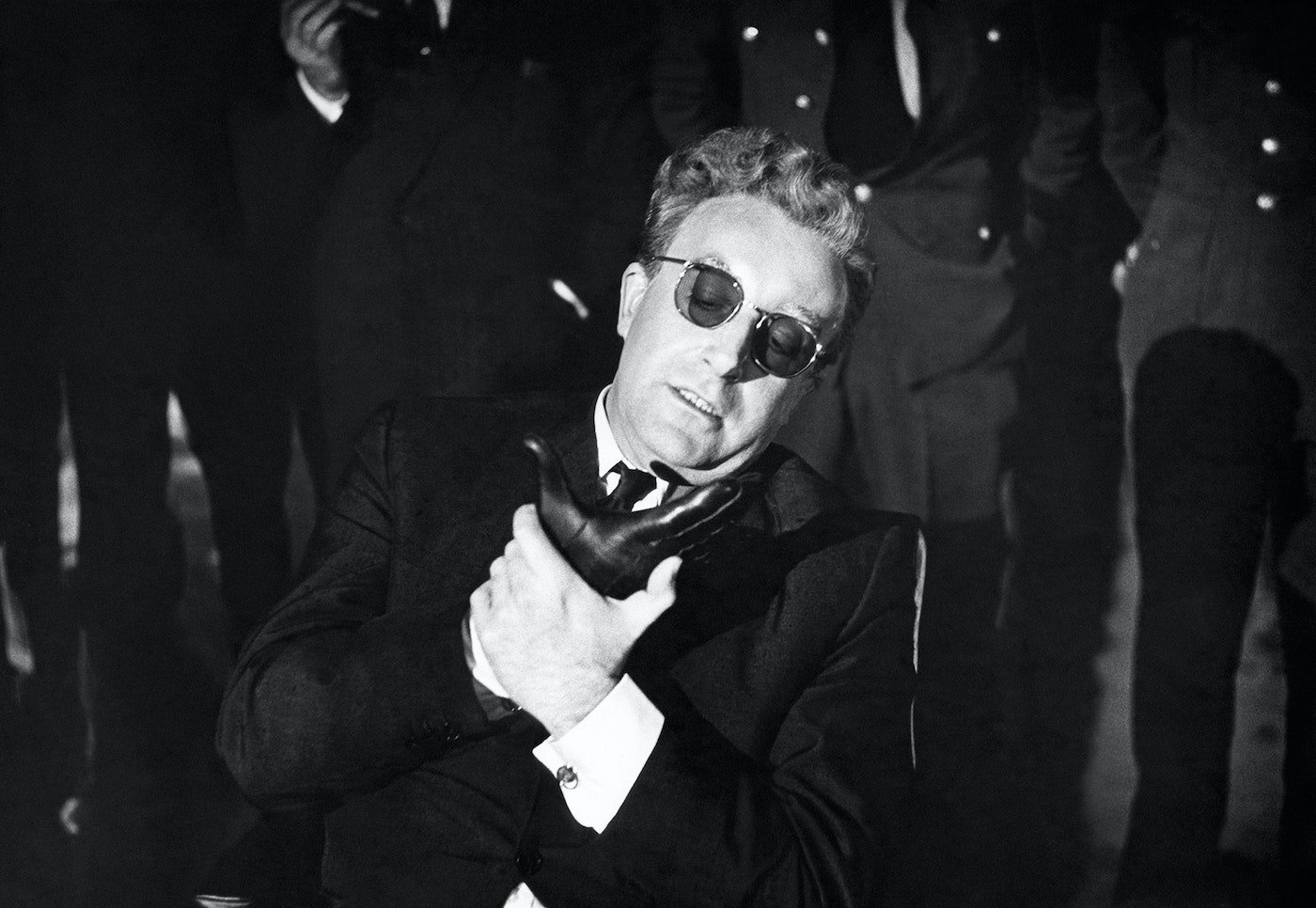
Getty
(United States, 1964) DIR: Stanley Kubrick
Contemporary commentators considered The Manchurian Candidate irresponsible. Strangelove took desecration to another level. Kubrick’s outrageous dark comedy of nuclear obliteration was a liberating exorcism. In 1933, the Marx Brothers mocked dictatorship with Duck Soup; three decades later, Kubrick and writer Terry Southern travestied the Bomb. Was a hard rain about to fall? Released less than two weeks before the Beatles made their U.S. debut on The Ed Sullivan Show, Strangelove ushered in the ’60s.
(United States, 1962) DIR: John Frankenheimer
The consummate political entertainment (and quintessential Kennedy-era thriller) is a baroque tale of mind control, assassination, and conspiracy, originally released at the height of the Cuban Missile Crisis. Although the most fantastic elements of American politics were acknowledged, just as the nation—even the planet—seemed headed toward total destruction, the movie came into its own as prophesy after JFK was murdered a year later. That it was withdrawn from circulation (albeit over a contract dispute rather than regret) only burnishes its cult reputation.
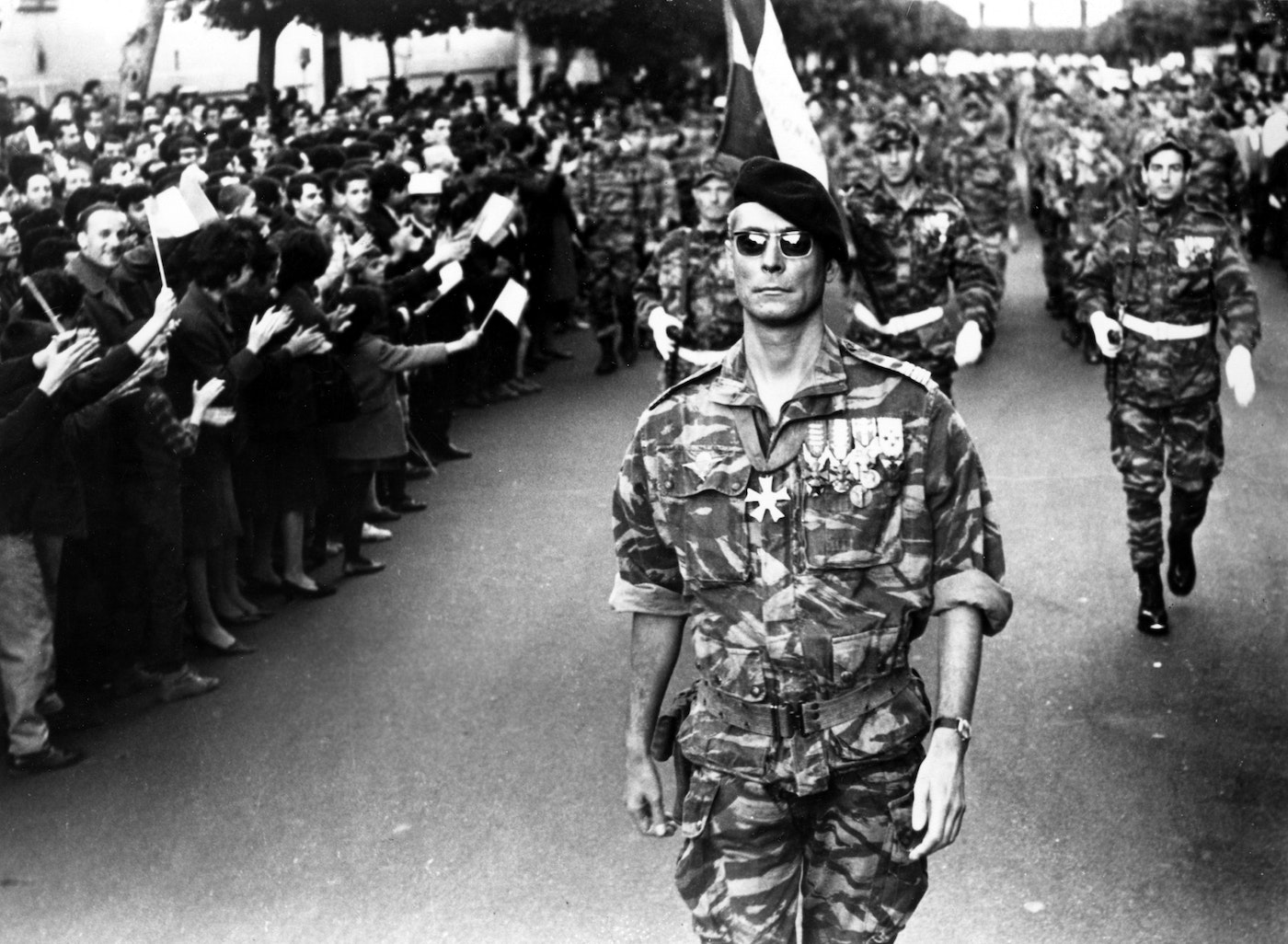
Everett Collection
(Algeria-Italy, 1966) DIR: Gillo Pontecorvo
Commissioned by the Algerian government, influenced by Frantz Fanon, shot like a newsreel, cast with nonactors, paced (and scored) like a thriller, Pontecorvo’s account of a bloody, anti-colonialist insurrection projected Italian neorealism into a new arena. The Third World spoke. That The Battle of Algiers had its U.S. premiere months after Newark and Detroit erupted insured its local relevance. The film was introduced as evidence during the trial of 13 Black Panthers charged with a conspiracy to bomb public places and murder police. After their acquittal, a juror wrote that The Battle of Algiers “did more to help me see things from the defense point of view than the DA suspected.”
What did we get right—and wrong? Vote now in our readers’ poll!

METHODOLOGY
The New Republic asked each critic to submit a list of at least 10 films, ranked from most to least significant. For each list, the highest-rated film received 10 points, the second highest received nine points, etc., with the lowest rated receiving one point. For lists that contained more than 10 films, each additional film received just one point. Because 10 ranked films received a total of 55 points, films listed by critics who submitted their choices “unranked” and in no particular order received 5.5 points each. The points for each film were then added together. Films that tied—that is, when two or more received the same number of total points—were ordered by the number of individual votes.
THE CRITICS
Sam Adams, Slate; Siddhant Adlakha; David Ansen, Palm Springs International Film Festival; Michael Atkinson, The Village Voice; Jami Bernard; Manuel Betancourt; Peter Biskind; Charles Bramesco; Richard Brody, The New Yorker; Dwight Brown, nnpa News Wire; Jeannette Catsoulis, The New York Times; Justin Chang, Los Angeles Times; Karen Cooper, Film Forum; Jordan Cronk, Film Comment; Gary Crowdus, Cineaste; Gary Dauphin; Peter Debruge, Variety; David Denby, The New Yorker; Thomas Doherty, Brandeis University; Alonso Duralde, The Film Verdict; Bilge Ebiri, New York Magazine/Vulture; David Edelstein; Steve Erickson, UC Riverside; David Fear, Rolling Stone; Kathy Fennessy, Video Librarian; Kenji Fujishima, Slant Magazine & TheaterMania; Chris Fujiwara; Graham Fuller, Cineaste; Devika Girish, Film Comment; Bruce Goldstein, Film Forum; Ed Gonzalez, Slant Magazine; A.S. Hamrah, The Baffler & n+1; Odie Henderson, Boston Globe; J. Hoberman; Travis Hopson, Punch Drunk Critics; Ann Hornaday, The Washington Post; Peter Howell, Toronto Star; Dave Kehr, Museum of Modern Art; Ben Kenigsberg; Lisa Kennedy; Glenn Kenny, RogerEbert.com; Stuart Klawans; Eric Kohn, Indiewire; Nguyên Lê; Emanuel Levy; Stuart Liebman, CUNY Graduate Center; Dennis Lim, New York Film Festival; Violet Lucca; Leonard Maltin, LeonardMaltin.com; Ben Mankiewicz, Turner Classic Movies; Mia Mask, Vassar College; Wilson Morales, Black Film and TV; Vikram Murthi, The Nation; Adam Nayman, Cinema Scope; Farran Smith Nehme, Self-Styled Siren; Darragh O’Donoghue, Cineaste; Michał Oleszczyk, University of Warsaw; Michael Phillips, Chicago Tribune; Nick Pinkerton; Claudia Puig; Leonard Quart, Cineaste; Jed Rapfogel, Anthology Film Archives; Rex Reed, Observer; Carrie Rickey; Lupe Rodriguez Haas, CineMovie.TV; Richard Roeper, Chicago Sun-Times; Jonathan Rosenbaum, JonathanRosenbaum.net; A.O. Scott, The New York Times; Gene Seymour, CNN Opinion & The Nation; Jose Solís; José Teodoro, Film Comment; David Thomson; Scott Tobias; Kenneth Turan; Dennis West, Cineaste; Armond White, National Review; Alissa Wilkinson, Vox; Deborah Young, The Film Verdict; Stephanie Zacharek, Time

